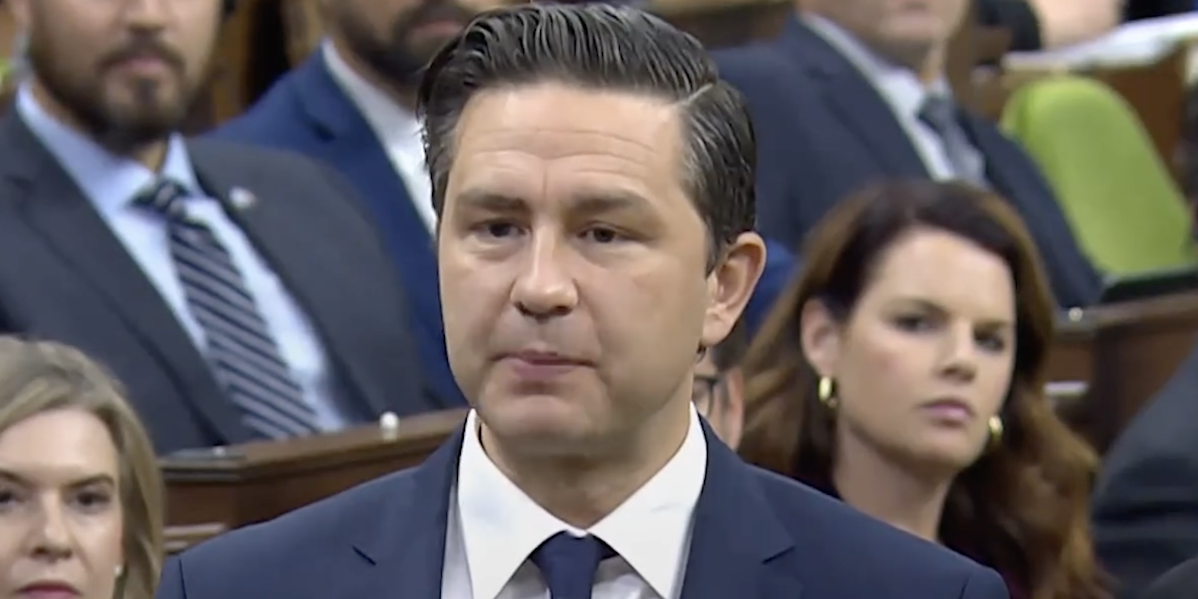A dozen years ago, Pierre Poilievre was a relatively obscure political figure who was mostly regarded — to the extent he was regarded at all — as a fiercely anti-labour guy on the far-right of the Harper cabinet.
But there he was in Parliament last February, voting in favour of pro-labour legislation banning scabs in federal workplaces.
Has he fundamentally changed his thinking — or was that simply part of his new, air-brushed “friend of the working man” look?
Surely, there should be a lot more media scrutiny of this mysterious individual who, after shedding his glasses and adopting a hipper look, has managed to reinvent himself on the public stage.
But the media has largely left him alone to construct his new persona.
As a result, few Canadians probably realize that the Conservative leader was — and likely still is — one of the most deeply anti-union members of Parliament. In 2012, he launched a campaign to bring Southern-style “right-to-work” laws to Canada — laws notorious for undercutting unions and keeping wages low.
Similarly, Poilievre’s decision last week to visit a combative roadside encampment that had overtones of the “Freedom Convoy” offered an important glimpse into the man we mostly see in a suit in Parliament.
Of course, Poilievre cultivated the support of right-wing fringe elements in the Freedom Convoy when it occupied Ottawa for three weeks in January 2022 — but that was before he was Conservative leader and the apparent runaway choice for prime minister.
For him to court that crowd again is surely newsworthy. But, oddly, his visit to the maritime encampment was treated by most in the media as a nothing-burger. Ho-hum. Let’s get back to the debate over carbon pricing … .
Not so fast.
The encampment was protesting the carbon tax, Poilievre’s big issue. But, as he and his strategists undoubtedly knew, the group has a history of blocking traffic at that location to protest vaccine-related public health measures. And its ramshackle camp featured “F—- Trudeau” flags and a trailer covered in graffiti-like insignia of the alt-right. Touring the site, Poilievre joined in with trash-talk: “Everything [Prime Minister Justin Trudeau] said was bullshit.”
However, when asked to pose for a photo near a F—- Trudeau flag, Poilievre insisted on a different background, revealing he was thinking strategically about how he’s seen cavorting with fringe right-wingers.
Poilievre and Conservative strategists know it’s going to be tricky keeping the support of the two very different factions backing him — the small hard-core right that is his base and the millions of centrist Canadians mostly interested in getting rid of Trudeau.
Many of these centrist voters undoubtedly disliked the disruptive, subversive tactics of the Freedom Convoy. And they’d almost certainly disapprove of Alex Jones, the nasty, right-wing American radio host who recently endorsed Poilievre.
Yet the mainstream media has shown little interest in delving into the Jones endorsement, investigating why Jones considers Poilievre “the real deal.”
Of course, Poilievre has no control over who endorses him.
But he should have no difficulty rejecting support from the likes of Jones, a ruthless character known for tormenting the families of children murdered in the 2012 Sandy Hook mass shooting — families that eventually won a billion-dollar lawsuit against him.
Rejecting Jones’ endorsement doesn’t seem like a lot to ask of a politician. But it was a bar too high for Poilievre, who left it to his office to put out a neutral statement that kept the door open to the far-right by avoiding saying anything negative about Jones: “We do not follow the individual you mention or listen to what he says.”
The media’s job is to hold the powerful to account, particularly someone poised to win the country’s top political job.
Probing Poilievre’s winking flirtation with fringe-right groups and a far-right monster like Alex Jones — as well as his past anti-union extremism — could provide us with crucial information that Conservative strategists are working hard to keep under wraps.



